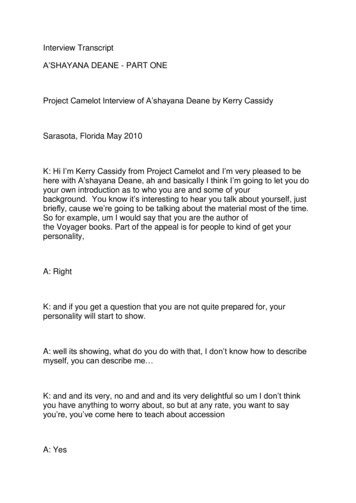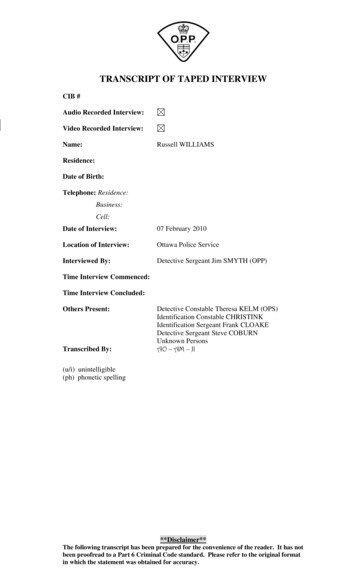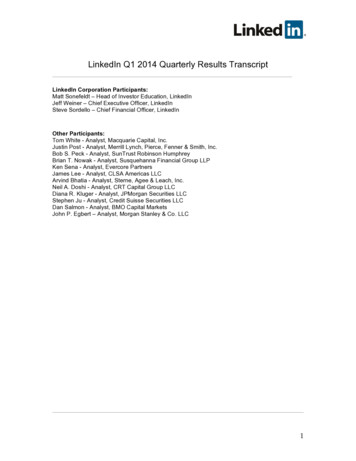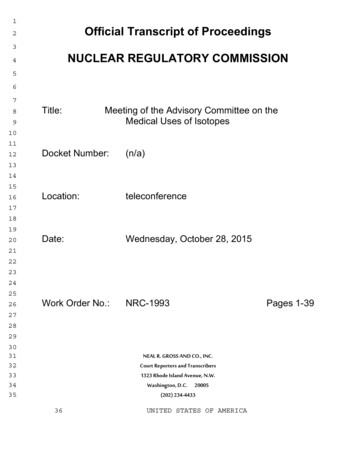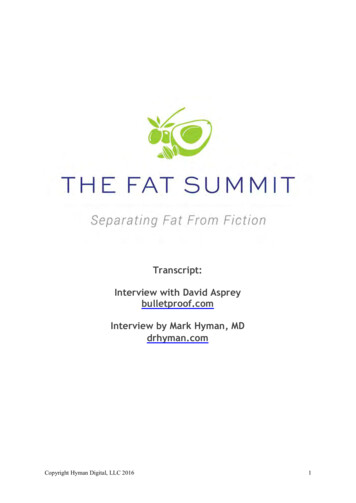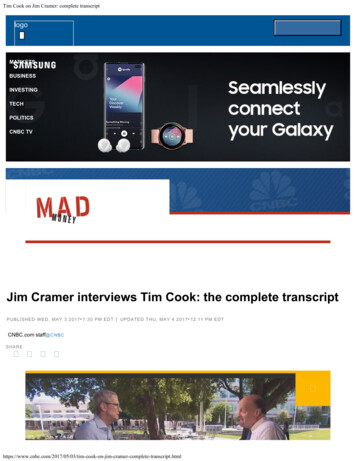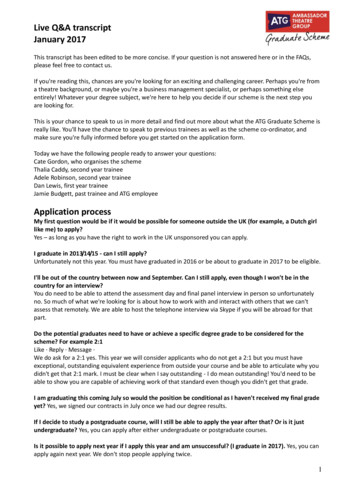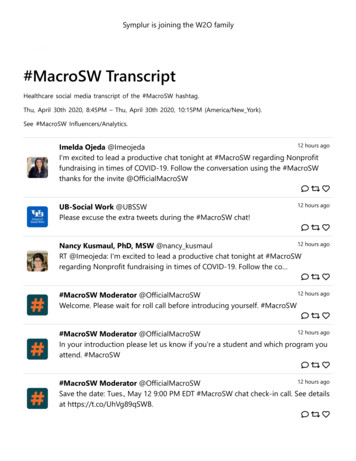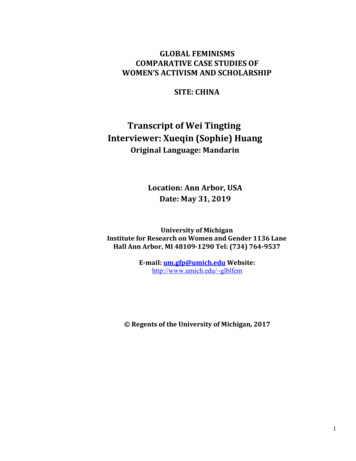
Transcription
GLOBAL FEMINISMSCOMPARATIVE CASE STUDIES OFWOMEN’S ACTIVISM AND SCHOLARSHIPSITE: CHINATranscript of Wei TingtingInterviewer: Xueqin (Sophie) HuangOriginal Language: MandarinLocation: Ann Arbor, USADate: May 31, 2019University of MichiganInstitute for Research on Women and Gender 1136 LaneHall Ann Arbor, MI 48109-1290 Tel: (734) 764-9537E-mail: um.gfp@umich.edu Website:http://www.umich.edu/ glblfem Regents of the University of Michigan, 20171
Wei, Tingting, born in 1988 in Guangxi, China, a Chinese LGBT and Feminist activist, majoringin sociology in college and graduate with a MA in anthropology from Wuhan University. Shestarted to get involved in feminist and LGBT movement since she produced and staged VaginaMonologues in Wuhan in 2007. She is the co-founder of national bisexual network in China,founder of Guangzhou Gender and Sexuality Education Center, and on thecommittee/counselor of several LGBT and feminist organizations. She was co-listed as the “10of the Most Inspiring Feminists of 2015” by MS Magazine in the US. She is also a psychologycounselor, writer, documentary producer and director. The documentary We Are Here sheproduced was screened in many countries.Xueqin (Sophie) Huang was born in 1988in Shaoguang, Gangdong province. She graduatedfrom Jinan University. She used to work as a journalist for a national news agency andprogressive newspaper. She is freelancing now, writing for Southern Metropolis Weekly, TheLivings, The Initium Media and NGOCN. Her reporting focuses on democracy development,civil society and the rights of disadvantaged groups in China. She published a report onworkplace sexual harassment of Chinese female journalists in 2017, which ignited andpromoted #Metoo movement in China. She is dedicated to women's rights and advocacy foranti-sexual harassment law. In 2019 she was jailed for several months for her reporting onHong Kong's pro-democracy movement.2
[Note: Some information has been redacted to protect confidentiality.]Huang Xueqin: Could you please first tell us a bit about yourself?Wei Tingting: OK, my name is Wei Tingting. Um, I’m thinking about how I should introducemyself. I am the founder of the former Guangzhou Gender and Sexuality Education Center(GSEC)1. At present in China, I have participated in women's rights-related work and havenearly more than 10 years of experience, but then our organization was recently closed(laughter). In the previous almost 10 years, I have participated in . for example, some actionsof the young feminist activists, and then in 2015, I was one of the “Feminist Five”2 who weredetained for participating in anti-sexual harassment activities. After that in Guangzhou I set upthis organization called Guangzhou Gender and Sexuality Education Center, but unfortunatelywe have recently been listed as an illegal organization by the Ministry of Civil Affairs . theorganization is suspected of being an illegal organization, so for various reasons, we shut downGSEC. This is a general introduction and account of my experiences. At the same time, I alsomake documentaries. In addition, I write some articles and do some investigative research.XH: After listening to your feminist history, it’s actually quite long.WT: (Laughter) A pretty long history.XH: But I want to know; everyone will want to know, how did you start your feministactivism, or where did your feminist thinking come from, and when?WT: Well, I think what’s pretty interesting is that my formal start, my feminist enlightenmentor when things took root, I think I should discuss an iconic event. I think it was in 200 . Can Italk about that? OK! If you want to discuss this iconic event, it should be in 2007 that I first hadcontact with and got to know the play "The Vagina Monologues"!3 In fact, that play was1 The Guangzhou Gender and Sexuality Education Center (GSEC), a leading non-profit organization in China dedicated tocombating sexual violence and promoting gender equality, was shut down on December 6, 2018 due to the government’stightening control over public discussion about women’s rights and non-profit organizations working on this front.2 The Feminist Five is a group of five young Chinese feminists who planned a demonstration against sexual harassment on publictransportation. They became known after the Chinese government arrested them for this demonstration.3 The Vagina Monologues is an episodic play written by Eve Ensler, which developed and premiered in New York and wasadopted globally. The play explores consensual and nonconsensual sexual experiences, body image, genital mutilation, directand indirect encounters with reproduction, vaginal care, menstrual periods, sex work, and several other topics through the eyesof women with various ages, races, sexualities, and other differences.3
particularly interesting. When I entered university in 2005, and was studying at WuhanUniversity, I was actually a very active person in our theatrical society. I also founded a club inour department, called "WE Drama Club." Every year, in this community, each theater companywould perform its so-called annual big production. I was still thinking about it, ah, what arewe going to perform this year? It was such a coincidence, one time when I went to the opticianto repair my glasses, it was when I was previously near-sighted, and while my glasses werebeing repaired, I had nothing to do. So I read the newspaper that was at the front of the tableat the optician’s shop. Ah, then it was such a pleasant surprise, as I was reading the newspaper,and reading it very close to me, I particularly remember that scene.Just reading the newspaper, it said a play was performed in Wuhan, called "The VaginaMonologues." I was curious about the name, and since I was in a drama group, as soon as I sawthe name, I thought, this is really interesting. After I returned to the dormitory, I started tosearch to figure out what kind of play "The Vagina Monologues" was. I discovered thatProfessor Ai Xiaoming at Sun Yat-sen University [in Guangzhou] had been putting on this playsince 2005.In 2007, another teacher, Peng Xiaohui [a famous sexologist who teaches at Central ChinaNormal University], brought the play to Wuhan. At the time, either the Wuhan Morning Newsor one of the Wuhan evening papers covered it. So I started searching for that script, and thenindirectly found it, I think on HBO, which aired an interview about [the playwright] Eve Enslerand the play. As soon as I saw it, I said, wow, this drama is so interesting; I thought, how aboutwe just perform this play this year –– why not?I then indirectly contacted Professor Peng Xiaohui. He took me to . he said ah, he has a versionof "The Vagina Monologues" that’s copyrighted by Professor Ai Xiaoming. So one day I took twoor three of my actors and we visited Prof, Peng together at his home. Was that his office or hishome? I forget. Then he showed us this movie. While we watched the film, I remember we wereall in tears! After the documentary was over, which was Professor Ai Xiaoming's version, wewere all moved and excited! Ah, whatever, we'll do this when we go back! Later, in fact, at thattime we didn’t know anything. We had very little sexual experience or anything like that, so wewent back and felt, wow, this is great! We’ll do it. Then we started to recruit actors, and then4
as the person in charge and director, I started to recruit actors, and we began to rehearse.Along the way we also made some changes to the scripts by ourselves. We changed scripts,added scripts, and then also selected from the earlier script; this is how we staged the play atWuhan University. I remember when we were performing, the scene was really . we reallydidn't expect that there would be so many people. Wuhan University has a place called the“Yingding”, also known as Sakura Castle;4 there’s a small theater there, and the whole placewas packed with people.XH: About how many people does the venue hold?WT: Probably more than 100; I guess maybe about 100 or 200 people. But it's a small theater,so in fact, there were people standing on the side in a circle or two watching it, and thenanyway, as soon as the play ended, everyone was applauding, blah, blah, blah. We thought thatfor a student at that time, wow, this really gave us a sense of achievement, and what’s more,the topic we addressed probably was considered to be pretty avant-garde at the time.XH: About sex.WT: Right, about sex, about women, about vaginas, etc. The name itself sounds like a veryavant-garde and shocking thing. So at that time we thought it was very interesting andmeaningful. In 2007, we put on one or two performances .maybe just one. Then a greatopportunity happened in 2009!XH: Uh-huh.WT: There’s a man named Huamei Chaoren, who is a member of the older generation in thetheater circle. He started again –– I forget whether he was influenced by what might be calledthe Fudan University version, or what ––he gathered people together from different citiesaround the country . to perform the "The Vagina Monologues." So he located me because heknew that I had staged it before in 2007. And if I am remembering correctly, in 2007, I hadLocated on the rooftop of one of Wuhan University’s dormitories is a garden of cherry blossoms, also called Sakura Castle.There is an old library on this rooftop and it is said to bring students good luck when they study there.45
made contact with some people in theater companies from Zhejiang University, FudanUniversity, including [the student group that focuses on gender-related topics] The ZhiheSociety; at that time I started to get to know them. So we staged the play again in 2009, and wealso expanded our group of actors to include people not at university, and I found anotherfriend to be the director. I was the equivalent of the producer and convener with responsibilityfor the entire project. So we had four performances throughout Wuhan at that time. We wentto different schools and social venues, and even a sexology museum to perform, so we alsobecame very influential. In Wuhan, in the first college student drama arts festival, we actuallytook the first-place gold medal, but then it was recalled because of the name of the play.XH: (Laughter).WT: Later, our actors who were there told me that we had originally won first prize. Theycalled me on the phone and said,” Director, what happened? We had initially won first prize,but then in the end, nothing?” Later they told me the reason was that the mayor would giveout the first prize award, so they thought that our play might not be appropriate as the firstplace recipient, and so they gave us a separate award for outstanding performance. But Iremember when we did that competition, after the performance, our actors told me that thejudges gave us a standing ovation, in other words, they actually approved of our play, but justbecause of this sensitivity issue, our prize was withdrawn.XH: I think it’s clear that this whole drama, or "The Vagina Monologues," still achievedgreat success. Why do you think it actually successfully attracted so many people–– whatis its avant-garde nature?WT: I think one reason is that first, it was because it was a student group that was dealing witha topic that related to sex, moreover, it dealt with sexual violence and private matters relatingto women –– things that aren’t really talked about and we showed that publicly on stage.XH: And in 2007, topics relating to sex hadn’t yet been fully developed or discussed; sonevertheless, there was space for this?WT: Yes, yes! And at that time these topics may have been new to most, or many young people,6
and I believe even today if we stage the show–– that is also relatively new, and it’s not a veryeasy topic to discuss. It can even be said that there are some taboo topics. So I think this is whystudents can feel, on the one hand it is taboo, but on the other hand, it is a very important topic.I want to give a small example. At that time, when we were doing that workshop, we would letour actors tell their own stories. This was a way to collect stories and share experiences witheveryone. We found that it was just like a line from Eva Ensler’s script: "as soon as women starttalking about sex, there’s no stopping them.”This story did really happen during the workshop. This person told a story, and immediatelyshe was followed by the next person who started talking, and then people kept talking aboutsexual orgasms, how to make love, and so on. Everyone was very interested in these topics,and they were very willing to talk about them. I’d like to go back to the question you just asked.I think it’s because ordinarily there are too few such platforms, where there is this kind of spacefor discussions about sex, and the different things that sex brought to us. It could be violence,it could be taboo, it could be orgasm, it might be about this change in our bodies. For example,when you have your period, how do you feel? So I think this touched on all aspects of thingsrelating to sex. Since there was no space to discuss these things, as soon as it was brought outin public, it attracted a lot of people's attention.XH: And women also want to be spontaneous and take the initiative (WT: Yeah!) andvoluntarily discuss something we previously thought was taboo, or existing in a privaterealm, about sex, because China ’s sex education is very deficient. So in this respect,college students, or you as one of the women, to organize a discussion like this, whatkind of influence do you think this had on the atmosphere of the larger society at thattime?WT: Me. what kind of influence did I have?XH: Or college students that advocated for these things?WT: I think for everyone, including me and the crew, I think it was a very good education,because through this we started to talk about our own stuff, in fact, you will find women’sstories are a great treasure. That is, many people will talk about different things. For example,7
some of our actors at the time had already graduated, one woman talked about her orgasms.Those of us who had no so-called sexual experience at the time, were really curious, and said,“ah hah, so that’s it!” Ah, then, so it’s like this, and then different people talked about theirmenstruation experience, and then we discovered, hey, their menstruation experiences arequite different. And one thing that I found particularly touching at the time involved a femalestudent who was my senior, and with whom I had a really good friendship. Before she came toact in the play, I didn't know some of her personal stories, but then she proposed to write ascript. What she actually wrote was a script about abortion.I didn’t learn until later, actually she was the one who told me, that in fact, it was her own story.So although as I said I was so familiar with this older female schoolmate, in fact, I had no ideathat she actually had such a sad story. She accidentally became pregnant and, in the end, hadan abortion. On her own accord, she took medicine to cause a medical abortion. So for me, Ifelt that this was a very new experience. In the past, I never realized that talking about genderor gender inequality was such an important topic. So for me, I think "The Vagina Monologues"was like that, looking back at my life experience, it was a turning point. After that, I started torealize that gender is actually a very important issue. And so many women have so manypersonal stories, whether it’s stories of oppression or wonderful things that happened, thathadn’t yet been explored. Therefore, after 2009, we started an organization called the WuhanWomen's Rights and Social Development Group.5WT: This was the impact on me personally, and then you just now asked about the impact onsociety. I think one impact is education, and another is that I think the female actors in ourcrew, as well as the men, all experienced a kind of empowerment, or opening up to some newperspectives. I remember when we performed in 2007, it was very interesting, because ourtheater company for this show only staged female performers. So all the men were doing stagemanagement, props, etc.; they were all helping out behind the scenes, backstage (laughter).5 Wuhan Women’s Rights and Social Development Group, originally named V-Day in Wuhan, is an organization established inApril 2010. The purpose of the organization is to help the public, especially adolescents, to learn more about sexuality and itspositive and negative consequences by promoting education for gender cultures and extending its diversity. The mainapproaches include screening movies and holding seminars. As of today, there are 474 members across the country followingthe website of the organization and its last post was in 2012.8
XH: All the leading roles were women; the men had supporting roles.WT: Yes, women are the leads, and later I let them introduce themselves; that is, at the end ofthe performance we had a concluding session for the whole group. Everyone talked about theirown experiences in the performance. The last one to do a concluding presentation was a malestudent who did stage management; he said, I want to dedicate this play to my mother, who isfar away in heaven. At that time, we were very moved. It seemed as if through the process ofhelping to stage manage the show, he created a new connection with his mother. Because thelast scene in the play is about giving birth, how human beings all come from our mothers’vaginas. So at that time, I thought, it was quite moving; that is, not only women were involved,but our male students also participated. And he perhaps realized at that moment that hismother –– it wasn’t so easy for her, to give birth to him. Either the difficult facets of being awoman, or something else that he unearthed.XH: In fact, this play was not only a way to let people understand women, or the peoplearound us, but also to connect more women through their common experiences. Menalso began to say that a critical door had been opened. This was an inspiration for yourown feminist thinking, an enlightenment, right?WT: Yes, even though at that time I might not have considered myself a feminist, or didn’t usea word to describe myself, but I already felt that this was an important thing and we should doit. I had a hazy sense that this was important.XH: It seemed like there was something planted in your heart.WT: Right, right.XH: There was a seed in your heart.WT: So afterwards, we formed the group we just discussed. Then that .XH: What did this group do?WT: Well, in the beginning, I was pretty much the main person, you could say I was the founder.9
And there were two people who had been involved in the play. One was Xiao Tie.6 Maybe youknow her? She is now the executive director of the Beijing LGBT Center. The other was myroommate at the time, but later, after graduation, she went to work at Alibaba.7 So I said, hey,look at the first three people in our production crew, all of our life paths were quite different.Oh right, later she went to work for Taobao. At that time, our work had several components;one of them was to show films, so we had a movie-viewing session either once a week or onceevery two weeks.XH: What were the main aspects of the movies you chose for the film viewing program?WT: We showed films that related to gender. "The Vagina Monologues,” and I screened onecalled . "Underage Prostitute" [“Sara” is the official English name of this Hong Kong film]8 andso on. Anyway, I forget, but we did this kind of activity several times. I also held seminars; itmight have entailed discussions about gender. I’ve forgotten specific details but can go backand check. Also, at that time, I think we searched the Internet and found that there weren’t thatmany organizations relating to gender. I found one at Sun Yat-sen University; it was a websiterelated to women, gender, and social development. This was done by Teacher Ai [i.e., wellknown professor Ai Xiaoming]9 and Teacher Ke10. In fact, it was after referring to this websitethat we came up with the name for our group. I see, yeah! We can name our group along theselines!Let’s call our group like this, and so in that way we just nailed down our name!XH: Well, isn’t that actually how you came to this issue initially, through this event ––you started to understand the issues of gender, gender equality and women's6 Xin Ying, aka Xiao Tie (Iron), is the executive director of Beijing LGBT Center. She became an activist in the sexuality equalityarea in 2009, and she became a full-time staff member in Beijing LGBT Center in 2012. She is also the co-curator of ChineseWomen’s Film Festival from 2012-2015.7 Alibaba Group Holding Limited is a Chinese multinational technology company specializing in e-commerce, retail, internet andtechnology. Its subsidiaries include Taobao, Alipay, Youku, etc.8 The movie tells a story about Sara exiling herself to Thailand and meets a child prostitute Dok-my. Through the process ofrescuing Dok-my, Sara becomes haunted by the memories of her own past that she was sexually abused by her stepfather.9 Professor Ai Xiaoming, born in 1953, is a feminist literary scholar and the co-producer and director of the Chinese version ofThe Vagina Monologues, one of the activists of the Stop Domestic Violence network. She is the Deputy Director of the Women’sStudies Center and director of the Sex/Gender Education Forum at the Sun Yat-sen University.10 Professor Ke Qianting worked closely with Prof. Ai Xiaoming since she was a Ph.D. student of Prof. Ai and involved in theproduction of The Vagina Monologues. After Ai’s retirement, Prof. Ke took on the leadership role of feminist programs at SunYat-sen University.10
oppression.WT: Right, right.XH: When did you start to become an activist?WT: Well, it was probably in 2009. I think there were two important things. One important thingwas that I was selected to join an international sex education group, an organization called MarieStopes International (MSI)11. Marie Stopes has a youth pioneer project, which is to train athousand young activists, who mainly focus on sex education. I was selected for sex education. Atthat same time, in the summer, I joined another LGBTQ group. At the time there were severalorganizations in Beijing that were very active and well-known, for example, the Beijing LGBT Center,12Beijing Gender Health Education Institute, Common Language (Tongyu),13 Aibai Culture and EducationCenter,14 and GS Magazine.15 These very active Beijing organizations organized a queer summercamp for young people.At that time, I was straight, and I was also selected for this summer camp, so I participated inboth summer training sessions at the same time. After I completed these two trainingprograms, at the Beijing LGBT Center summer camp, I had already talked to them at that time,because we already had this group, and I had contacted them at the time and said, hey, I wantedto put on their Queer Film Festival in Wuhan, because there was no such event in those days.The young pioneers group also had a tiny, small grant, so I did a theater project called “ZeroTheater.” The project was to put on some forum discussion theater, or practical theater, anduse drama to do sex education. From a certain perspective, this was the case.11 Marie Stopes International is a nonprofit organization that provides contraception and safe abortion services to enable womenall over the world to choose their own futures.12 Beijing LGBT Center is a nonprofit organization focused on advancing gay, lesbian, bisexual and transgender rights in China.The group was founded in 2008 and provides services such as an LGBT-friendly therapist network and a hotline for transgenderindividuals.13 Common Language (Tongyu) is a non-profit organization founded in 2005. It focuses Chinese LGBT groups which get abusedwhen they are facing issues like sexuality, sexual orientation, gender identity and gender performance. It provides face-to-facetutor, public education and related policy advocacy to eliminate discrimination and violence based on gender.14 Aibai (Culture and Education Center), one of the earliest Chinese LGBT websites, founded in 1999. Before the rise of newmedia, Aibai was always the main access LGBT new source for Chinese community. In 2006, it was the only information sourceabout LGBT in Chinese format. It also has an “LGBT Q&A” board held by Damien Lu through various platforms.15 GS (GaySpot) Magazine is an independent non-profit magazine. It’s the most influential independent LGBT media in China. Itchanged its name from Spot to GaySpot in 2014. The magazine focuses on LGBT culture, rights and lifestyles and launches over60 cities in Chinese LGBT institutions.11
XH: Oh.WT: So at that time, I established some connections. After returning from the summer camptrainings, I had a stronger sense of the concept of “activist.” Before in a group with basically noresources in one location, I had a kind of hazy, unclear feeling doing my work. After 2009, itseemed like I was talking to some so-called international organizations (XH: Ha ha) or bigshots, or whatever. It felt a little bit like I was finding the organization or having some cleareridentification. I think it was also the first time that I had contacted the “comrade”16 or LGBTcommunity on such a large scale, but talking about comrades is another matter. Originally, Iwas an unusual undergraduate student, I wanted to do research related to comrades. So after2009, I had two aspects, one was gender, and the other was to do LGBT-related work. And atthat time I, uh, the story is so long, I really feel that two hours [for the interview] is not enough.I’ll talk about gender first. Anyway, because of some "factors," our original gender group slowlydid less work, because our main people participated in the work of another gay group calledWuhan Rainbow, and then they became core members of that group. So my main focus turnedto comrades. Then I graduated in 2011, so during that period of one or two years, I was doinggraduate studies, writing my thesis, and also doing the work of the small group I justmentioned. After I graduated in 2011, I started to do headhunting for a while.XH: Oh.WT: Then I did head-hunting work.XH: You were also a headhunter.WT: Right, after graduation I looked for a job. I went to one, and finally chose a headhuntingcompany, and then worked there. But when I was doing headhunting, I felt, like every day Iseemed to be wasting my life, and I also felt that I might actually have an activist’s blood insideme. Sometimes my brain would think only about, hey! What activities is our group doing? Then16 “Comrades” is used extensively during the era of Mao and later years, which refers to a fellow socialist or communist. In thisdefinition “tongzhi” refers to people who share similar (tong) interests or aspirations (zhi). In the past couple of decades, theterm changed its meaning due to the influence of the movement of gay rights in Hong Kong and Taiwan. Now the term is widelyadopted to refer to homosexual communities and individuals.12
I thought about where to go to participate in a lala (lesbian) camp or whatever kind of activity.I actually wasn’t really focused on work at all. And that job was a bit boring. When you firststart out at the job, you have to make cold calls; that is, every day you have to contactcustomers, and you have to count how many you did each day and note how it went. Thenthere was a good opportunity. Later, it seemed that because I and another colleague performedwell, we were selected by the Wuhan branch of the company to go to Beijing for training, andso then I went for a sort of group training. I was there for a month or so, food and lodging wereprovided, so I just stayed there. So I took advantage of that month in Beijing, because I wasalready thinking about changing jobs at that time, to start looking for work in Beijing.XH: Actually, if you have restlessness in your blood, then you’re an activist.WT: Yeah, right. Then I felt really bored. So when I was looking for work in Beijing, there weretwo organizations that were involved in LGBT issues that gave me offers. I did a comparison,pros and cons of each, and chose the Beijing Gender Health Education Institute17, which wasone of the earliest gay organizations in China. I then went to work there full time. So in aboutSeptember or October, after I returned to Wuhan from the training in Beijing, I immediatelyresigned. My Wuhan colleagues thought that was really strange, and said, why did they sendyou off for training, and then you resigned as soon as you got back? Then even when I wantedto resign, they wanted me to stay, saying that the company boss kept asking, why was I leaving?I didn't tell them why; I just said that, anyway, I wanted to leave. So I resigned, and then inNovember moved to Beijing and started my job at Beijing Gender Health Education Institute.So then I started a full-time job.XH: So as you were just saying, at first, after you did theater, you were focused on genderand sex education, and later, as you also just said, you were at that time a straightwoman, but afterwards.did the work you were doing make you have a betterunderstanding and acceptance of yourself ?17 The Beijing Gender Health Education Institute (BGHEI) is a non-governmental and non-profit organization founded in 2002.One of the first Chinese NGOs to focus on issues related to gender, sexuality and sexual health, BGHEI’s mission is to advocateand raise awareness about sexual diversity and equality in Chinese society.13
WT: I think . . .XH: Do you mind talking about this aspect of your life?WT: No, of course not. I think there were two aspects. During this time period, I discovered,well, that perhaps I could like women, or that I was interested in women. The main reason wasbecause in 2009, when I went to that workshop (in Beijing), there was a T18
3 The Vagina Monologues is an episodic play written by Eve Ensler, which developed and premiered in New York and was adopted globally. The play explores consensual and nonconsensual s
